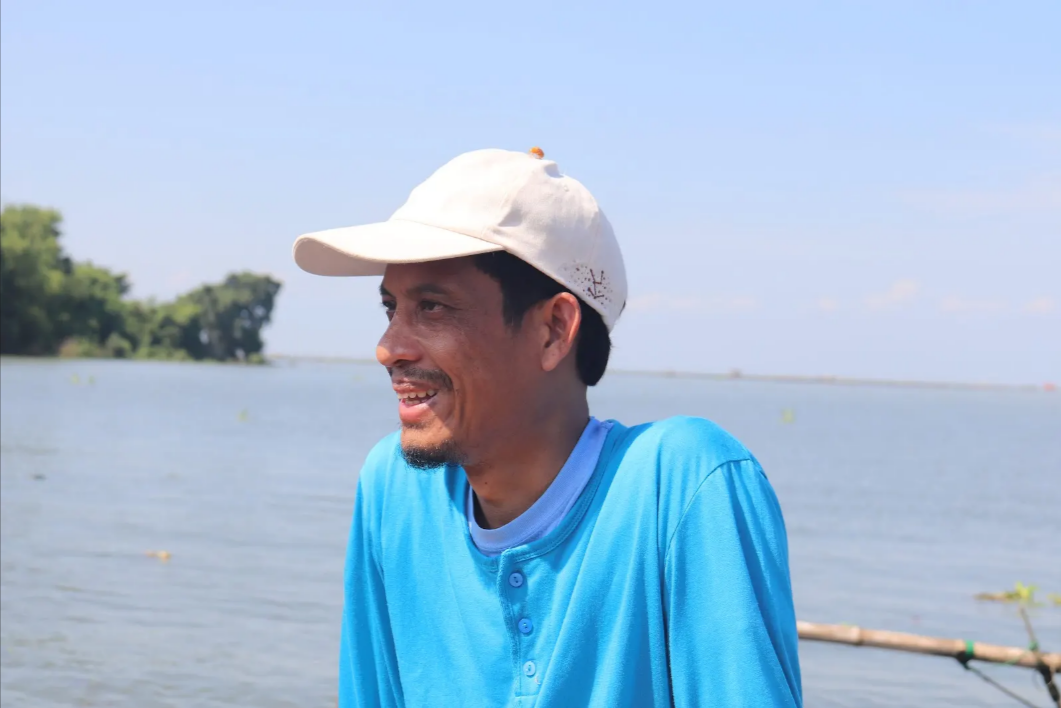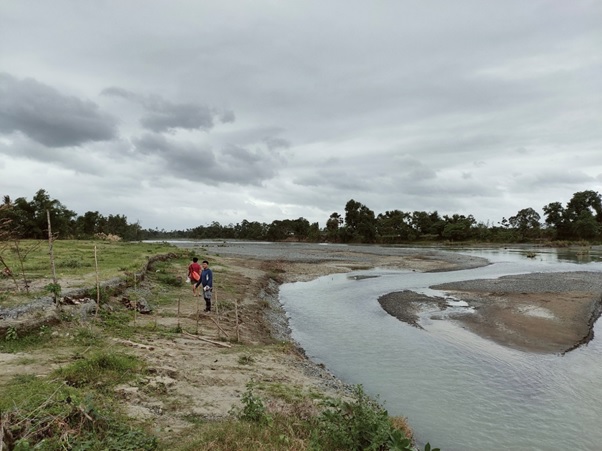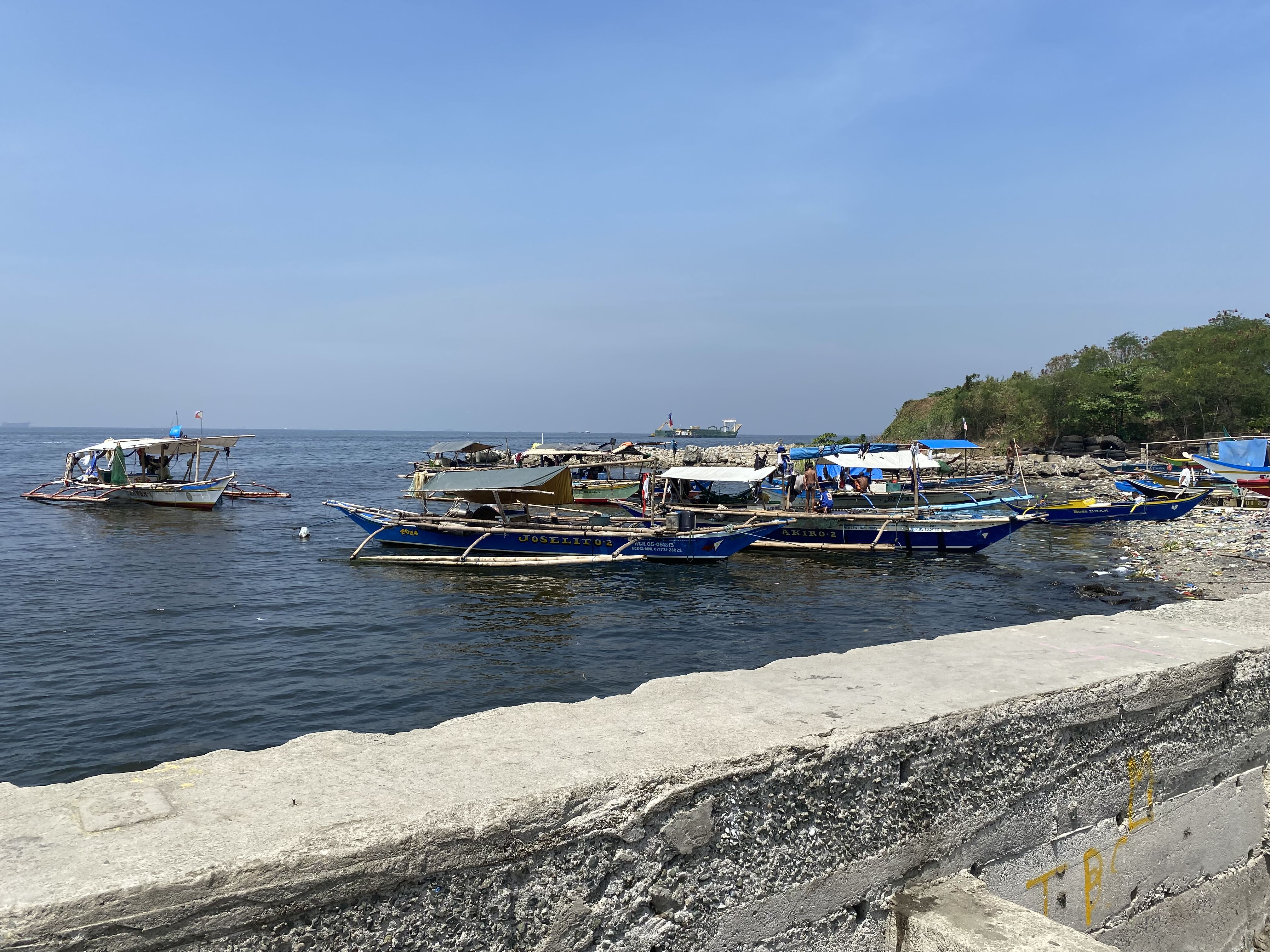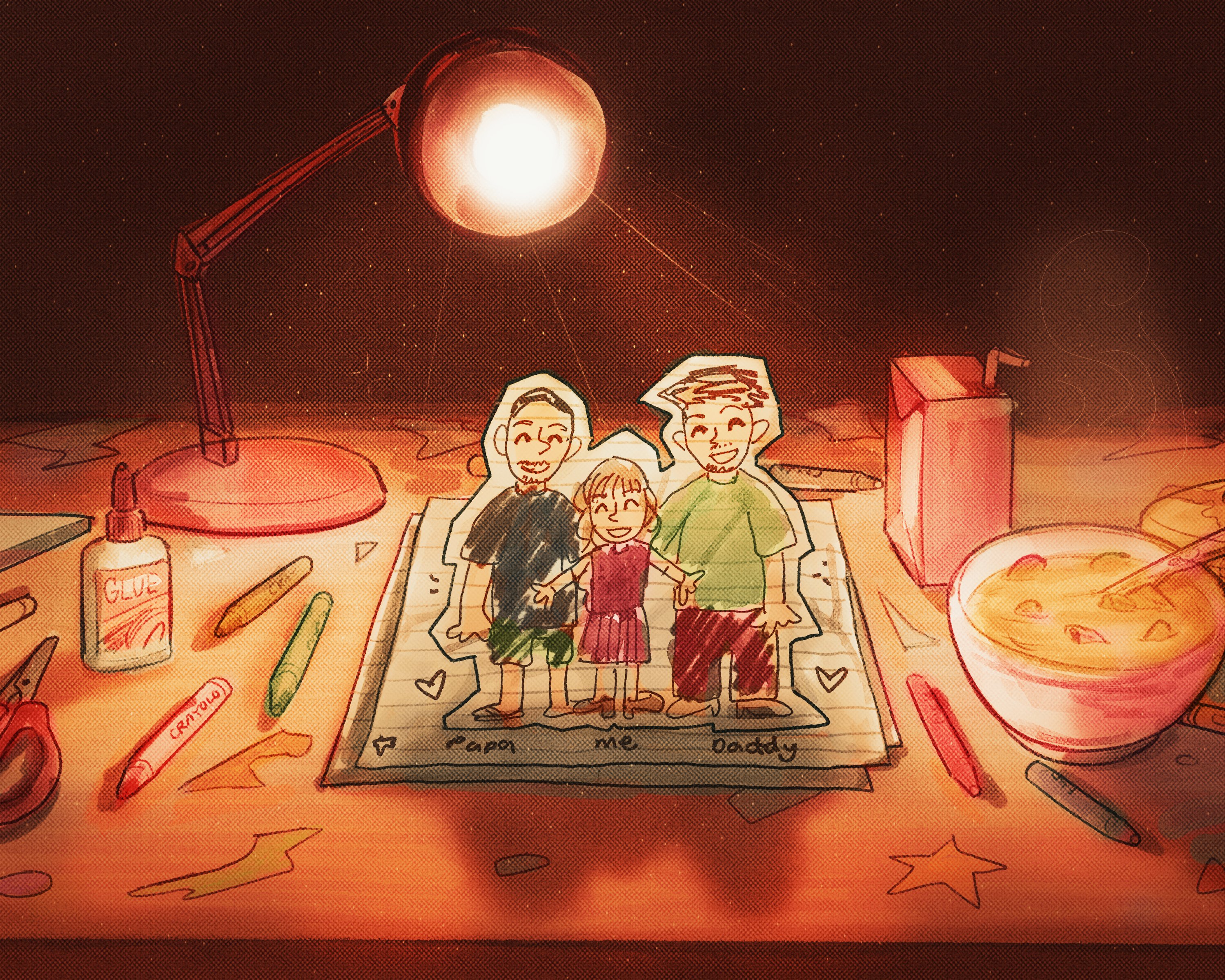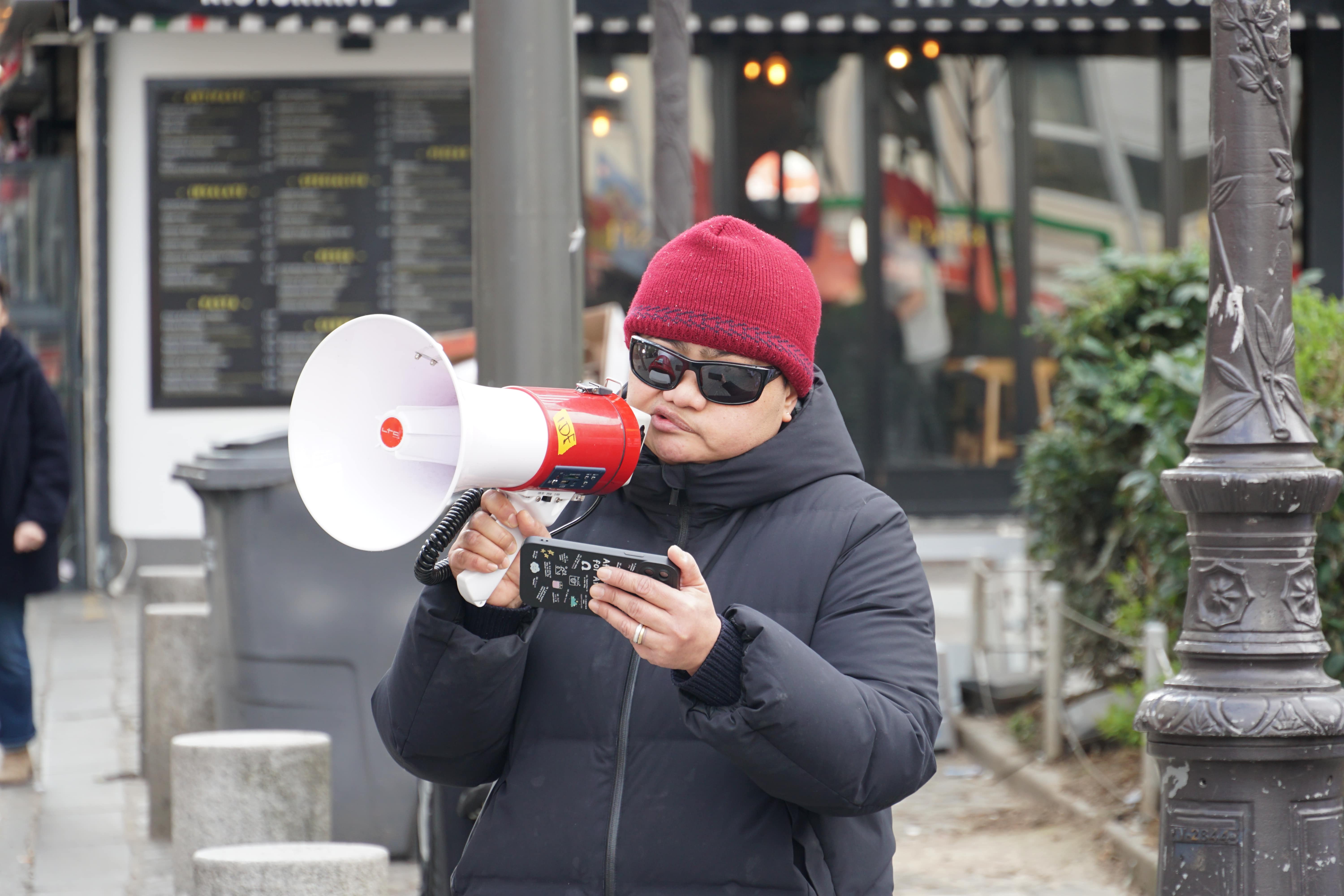Ronnel Arambulo arrived by his boat to greet me at Binangonan Port, dressed in his signature blue outfit. It was seven in the morning and some fisherfolk were already out in the lake trying to get their day’s catch. I climbed aboard his boat and, while traveling across the water, he pointed toward all the spots fish frequented and taught me the methods to catch them.
 Ronnel arrived by his boat to greet me at Binangonan Port, dressed in his signature blue outfit as a proud representative of his sector. (Alexa Antoinette Sambale/Philippine Collegian)
Ronnel arrived by his boat to greet me at Binangonan Port, dressed in his signature blue outfit as a proud representative of his sector. (Alexa Antoinette Sambale/Philippine Collegian)
We settled on a quiet bank where we discussed his life as a fisherman-turned-aspiring-senator. There, he shared his passion for organizing, fishing, and singing. I listened to him sheepishly perform a rendition of Ewan by APO Hiking Society, its lyrics altered to mock the Maharlika Investment Fund.
For 48 years, Ronnel has roamed the shifting waters of Laguna de Bay, his hands toughened by decades of steering boats and casting nets. Experience granted him knowledge of every aspect of the lake, from the best fishing spots for certain seasons to the all-too-familiar issues that ail its waters.
 Behind Ronnel’s modest demeanor is a defiant leader who recognizes the need for change against an oppressive system. (Alexa Antoinette Sambale/Philippine Collegian)
Behind Ronnel’s modest demeanor is a defiant leader who recognizes the need for change against an oppressive system. (Alexa Antoinette Sambale/Philippine Collegian)
But now, Ronnel confronts the tides of a sea he has not yet traversed before: the Senate race. Under the banner of the Makabayan slate, the fisherman campaigns to protect the country’s waters from exploitation and ensure food security for all.
A Life by the Lake
Born in 1976 to a family of fisherfolk in Binangonan, Rizal, Ronnel was practically raised by Laguna de Bay and would often accompany his folks on fishing trips. The lake became his playground and Ronnel was one of its troublemakers, hitching rides on passenger boats before getting scolded.
Despite being a rambunctious child, Ronnel still appreciated the gifts of the lake. By the shore, he and his friends would scavenge torn and discarded gillnets then set them up in the water. The richness of the waters was such that, with even little effort, it provided them with fish to take home later that afternoon.
“Yung mga mangingisda noon kahit sa maikling oras lamang, three to four hours, kaya na i-sustain ang pangangailangan,” Ronnel said.
It was in this small town that he began dating Edilyn, his childhood friend. “Simula po kabataan talaga siya na ‘yong tinibok ng aking puso,” Edilyn said.
But their young love did not initially last. Personal differences caused them to part ways, then unexpectedly reunited again in Laguna in 2017. Ronnel and Edilyn interpreted this as the work of destiny, eventually opting to continue their relationship and get married.
The childhood sweethearts settled down in their hometown of Binangonan. Their house would be filled with music as Ronnel enjoyed guitar, singing, and songwriting as hobbies. Still, he spent most of his time in the lake hauling fish to sustain his family.
“Si Ronnel kasi, masipag na tao at talagang dedicated ‘yan sa pamilya. Syempre bilang mangingisda, ayon po ‘yong kinabubuhay namin,” Edilyn said.
Over the years, Ronnel specialized in a type of fishing called “tibog”. He demonstrated the technique while I rode with him on his boat by first untangling and scattering the nets in a circle. You can tell a genuine fisherman by the ease in which they cast their nets, he remarked. With a long pole, Ronnel disrupted the water and gathered the fish into the trap.
Ronnel demonstrates the techniques of tibog, a type of fishing he specializes in. (Alexa Antoinette Sambale/Philippine Collegian)
However, Ronnel explained that the quality and quantity of his catches have declined compared to when he was a child.
He realized that the lake’s deterioration began with the introduction of “development” projects such as the Napindan Hydraulic Control Structure in 1983. It was intended to control saltwater intrusion but the deprivation of saltwater from the brackish lake proved detrimental to its ecosystem with 20 species no longer present since its construction, according to fisherfolk rights group Pambansang Lakas ng Kilusang Mamamalakaya ng Pilipinas (PAMALAKAYA). Now, the dam merely diverts floodwater from Metro Manila to Laguna de Bay, which contributes to flooding and pollution in coastal areas.
Such challenges caused long days with catches too insufficient to even pay debt. “Naalala ko pa sa isang lending, ang hulog namin doon araw-araw sa panahon na iyon nasa 120 pero minsan nakakahuli ka lang nasa 100 pesos, so kulang pa doon sa utang mo at doon sa pakain mo sa pamilya mo, so kailangan mo ulit mangutang,” Ronnel said.
 Destructive projects caused Ronnel to experience long days with catches too insufficient to even pay debt. (Alexa Antoinette Sambale/Philippine Collegian)
Destructive projects caused Ronnel to experience long days with catches too insufficient to even pay debt. (Alexa Antoinette Sambale/Philippine Collegian)
During that time, Ronnel was still unaware of the reason underlying the prioritization of such destructive projects. But that all changed when PAMALAKAYA organized in his barrio to explain the issue of dredging projects under former President Gloria Arroyo‘s administration.
Ronnel was initially hesitant to listen to the fisherfolk group’s discussions, believing the dredging to be nothing more than clearing mud from the lake’s bed. Gradually, he understood the actual motive for such a project—to deepen the lake and allow ferry boats inside its waters, commercializing the area.
These realizations willed Ronnel to join PAMALAKAYA as a full-time organizer in 2007. “Napalalim pa [ako] sa mga iba-ibang isyu hanggang sa naging bahagi na rin ako sa pagpapaliwanag sa mga bagay na iyon,” he said.
Political Undercurrents
Ronnel began his activism by joining protests and making accompanying props before taking an interest in educational discussions. He frequently conversed with PAMALAKAYA Chairperson Fernando Hicap about their understanding of fisherfolk issues.
Hicap saw his potential as a discussion instructor, but Ronnel felt himself to be shy and reserved—traits he still struggles to overcome to this day. He was soft-spoken, his voice occasionally drowned out by the passing waves while we talked, yet his words carried the weight of the reality of his sector. Over time, however, he felt comfortable enough to share his knowledge and analysis of fisherfolk issues with his community.
After all, Ronnel experiences these firsthand. Right next to where we were talking by the shore, Ronnel pointed to the land being reclaimed under the expressway project Laguna Lakeshore Road Network. The erected dike has made the community, including his home, prone to flooding, worsened the lake’s water quality, and disturbed fish in the area, he said.
 A portion of land reclaimed under the Laguna Lakeshore Road Network project. (Alexa Antoinette Sambale/Philippine Collegian)
A portion of land reclaimed under the Laguna Lakeshore Road Network project. (Alexa Antoinette Sambale/Philippine Collegian)
As of 2024, there are at least 239 proposed and ongoing reclamation projects in the country. More than 25 million Filipinos are at risk of displacement from these projects, with fisherfolk harvests already declining to as much as 86%, according to an investigation by Altermidya.
“Magkakalayo lang ang mga mangingisda, pero di sila magkakaiba ng sitwasyon,” Ronnel said.
In response to these threats, Ronnel has organized alliances by rousing communities around Laguna Lake such as in Calamba and Muntinlupa. These efforts led to the relaunched Save Laguna Lake Movement, formed to oppose the lakeshore project.
Ronnel’s fight for fisherfolk rights began long before his Senate campaign, representing them in dialogues with local governments and hearings with legislative committees tackling reclamation projects in Laguna. Due to these efforts, he eventually became the chairperson of PAMALAKAYA Rizal for a time before being elected as vice chairperson of PAMALAKAYA National.
These advocacies are intimately tied to the interests of the Filipino people at large, Hicap believes. “Ang issue ng mangingisda, issue nating lahat. Yung pagtatanggal sa ating pangisdaan, yung pagpapanatili sa kanya as pangisdaan na source, yung pagkain natin, ay para rin sa Pilipino at sa susunod na henerasyon,” he said.
An Upstream Battle
Protecting fisherfolk livelihoods is critical, but the road to genuine representation is not without its obstacles. Ronnel grapples with numerous challenges, both personal and campaign-related, in his bid for a Senate seat.
As a senatorial candidate, Ronnel’s schedule is packed with campaign activities that whisk him away from his hometown—a drastic difference from his quiet life as a fisherman and family man. He travels frequently among communities, rallying people behind his cause. When he is not on the road, Ronnel juggles studying the fundamentals of lawmaking and media engagements, such as video messages and interviews.
Ronnel tries to muster all the support he can get because he faces stiff competition in his fight for change. Prominent political names and established dynasties vying for the same Senate seat possess the capital and machinery for campaigning, yet Ronnel still believes he has an edge through the people’s backing. “Naniniwala tayo na mas tayo ang nakakaalam ng kalagayan ng mga mangingisda, ng mga mamamayan kasi tayo mismo nasa grounds,” he said.
Time was a resource highly demanded from Ronnel that often left Edilyn without his presence for weeks to even months. At times, she was tempted to sulk about their lack of time together, but understood the importance of his husband’s goals and the necessary sacrifices to achieve them. “Kaya kapag nandito siya, [sa pagluluto] niya binabawi lahat ng oras na wala siya,” Edilyn said.
Outside his home, Ronnel experiences other challenges in the form of state harassment. In 2022, an individual claiming to be maritime police went directly to his home and attempted to bribe Ronnel, demanding the fisherman stop his organizing and become an informant. But Ronnel did not sell his cause.
This was not his first time encountering state suppression. In 2010, police arrested Ronnel after he campaigned against demolition efforts in Lupang Arenda, Taytay. For three days, he was interrogated and accused of terrorism before being released due to mounting public pressure.
 Ronnel recounts the time he was arrested and accused of terrorism for campaigning against demolition efforts in Lupang Arenda, Rizal. (Alexa Antoinette Sambale/Philippine Collegian)
Ronnel recounts the time he was arrested and accused of terrorism for campaigning against demolition efforts in Lupang Arenda, Rizal. (Alexa Antoinette Sambale/Philippine Collegian)
Now, the state is attempting to hinder the whole Makabayan bloc in their election efforts by charging illegal assembly raps against 10 of their candidates, including Ronnel. The charges stemmed from a peaceful rally they participated in during Bonifacio Day on Nov. 30, 2025.
Despite these threats, Ronnel remains steadfast in continuing his senatorial campaign. “Kung meron ka dapat ikatakot, [iyon] ay mapanatili ang ganitong klaseng sistema na siyang nagpapahirap sa mangingisda at sa mamamayan,” he said, his conviction supplanting his usually reserved demeanor.
In the turbulent tides of politics, Ronnel charts his course to a Senate seat, undeterred by threats. The same resilience that has guided him through long days of fishing now fuels his fight to champion the rights of his sector. ●
